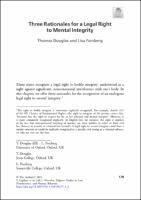Chapter 8 Three Rationales for a Legal Right to Mental Integrity
| dc.contributor.author | Douglas, Thomas | |
| dc.contributor.author | Forsberg, Lisa | |
| dc.date.accessioned | 2022-04-14T14:07:31Z | |
| dc.date.available | 2022-04-14T14:07:31Z | |
| dc.date.issued | 2021 | |
| dc.identifier.uri | https://library.oapen.org/handle/20.500.12657/54057 | |
| dc.description.abstract | Many states recognize a legal right to bodily integrity, understood as a right against significant, nonconsensual interference with one’s body. Recently, some have called for the recognition of an analogous legal right to mental integrity: a right against significant, nonconsensual interference with one’s mind. In this chapter, we describe and distinguish three different rationales for recognizing such a right. The first appeals to case-based intuitions to establish a distinctive duty not to interfere with others’ minds; the second holds that, if we accept a legal right to bodily integrity, then we must, on pain of philosophical inconsistency, accept a case for an analogous right over the mind; and the third holds that recent technological developments create a need for a legal right to mental integrity. | en_US |
| dc.language | English | en_US |
| dc.subject.classification | thema EDItEUR::P Mathematics and Science::PS Biology, life sciences::PSA Life sciences: general issues | en_US |
| dc.subject.other | mental integrity; legal right | en_US |
| dc.title | Chapter 8 Three Rationales for a Legal Right to Mental Integrity | en_US |
| dc.type | chapter | |
| oapen.identifier.doi | 10.1007/978-3-030-69277-3_8 | en_US |
| oapen.relation.isPublishedBy | 6c6992af-b843-4f46-859c-f6e9998e40d5 | en_US |
| oapen.relation.isPartOfBook | ad387141-94f3-455c-9cb3-3fb5645c7280 | en_US |
| oapen.relation.isFundedBy | 178e65b9-dd53-4922-b85c-0aaa74fce079 | en_US |
| oapen.relation.isbn | 9783030692766 | en_US |
| oapen.collection | European Research Council (ERC) | * |
| oapen.collection | EU collection | * |
| oapen.pages | 23 | en_US |
| oapen.grant.number | 819757 | |
| oapen.grant.program | ProtMind |

